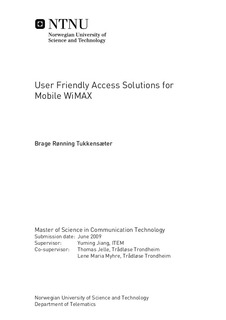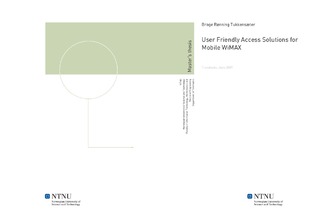| dc.description.abstract | Today, WiMAX networks are deployed several places worldwide. To get access to these networks, users have to buy equipment specialized for one operator with a subscription. User equipment has earlier been stationary or mounted, but with the Mobile WiMAX amendment, smaller receivers are made possible. Mobile WiMAX allows users to move between different operators, making user access and roaming a more challenging task. In this thesis, several Mobile WiMAX access solutions are discussed, emphasizing security and user friendliness. A captive portal solution is developed, and an EAP-TTLS (Extensible Authentication Protocol - Tunneled Transport Layer Security) solution utilizing FreeRADIUS is planned. Security in WiMAX is compared to Wi-Fi very good. Even in an open WiMAX network traffic can be encrypted, this makes a WiMAX captive portal solution secure for most purposes. For traveling or visiting users, the EAP-TTLS solution may be complicated to use. Users need an account prior to the connection, or the visited operator needs roaming agreements with the user s home operator. Roaming agreements are not common today, but is currently promoted by the WiMAX Forum. With the captive portal, users are able to buy access without having an account or subscription in advance. A captive portal solution is recommended for visiting users, and EAP-TTLS without roaming is recommended for users more permanently located in the operator s area. EAP-based roaming may be deployed if roaming becomes more common in the future, but is not recommended today. In this thesis, several Mobile WiMAX access solutions are discussed, emphasizing security and user friendliness. A captive portal solution is developed, and an EAP-TTLS (Extensible Authentication Protocol - Tunneled Transport Layer Security) solution utilizing FreeRADIUS is planned. Security in WiMAX is compared to Wi-Fi very good. Even in an open WiMAX network traffic can be encrypted, this makes a WiMAX captive portal solution secure for most purposes. For traveling or visiting users, the EAP-TTLS solution may be complicated to use. Users need an account prior to the connection, or the visited operator needs roaming agreements with the user s home operator. Roaming agreements are not common today, but is currently promoted by the WiMAX Forum. With the captive portal, users are able to buy access without having an account or subscription in advance. A captive portal solution is recommended for visiting users, and EAP-TTLS without roaming is recommended for users more permanently located in the operator s area. EAP-based roaming may be deployed if roaming becomes more common in the future, but is not recommended today. | nb_NO |

